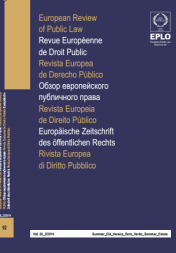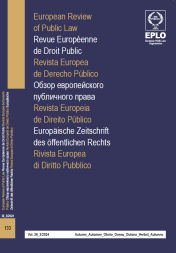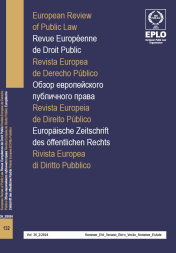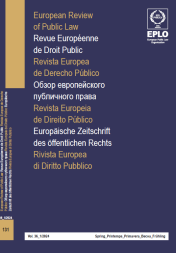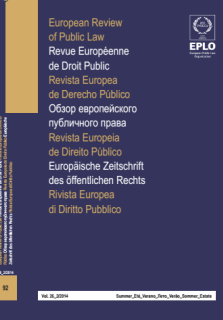
Editorial
ERPL, vol. 25, no 3, autumn 2013 (89)
In this ERPL issue, there are five articles on different public law issues, reflecting once again the multilingual and multinational character of the Review: The first article deals with the issue of striking a fair balance between the individual interests and the general interest, by using as a starting point the dissolution of the terrorist organization ETA by the Portuguese Constitutional Court. The second article, by examining selected cases from Portugal, Greece and Italy, concludes that the current economic crisis more and more will be forcing the South-European jurisprudence to re-capture social rights from a moral rather than economic human rights point of view. The model of the judiciary and the tax risks of the Russian taxpayer associated with international tax optimization are the issues dealt with in the third article published in this ERPL issue. The fourth article aims to analyse the tendency towards convergence among the different European systems of administrative justice and focuses on the 2010-2012 reforms in Italy, introducing a new action to obtain the adoption of an act unlawfully denied by a public authority, the azione di adempimento. The section of Articles is concluded with an article studying the judicial powers of regulatory authorities in France and in the UK, highlighting the paradox that, although both countries share a common conception of these powers and a common understanding of the notions of administrative decisions, administrative sanctions and regulations, the way in which these powers are exercised and reviewed by Courts differs greatly.
In the section of chronicles on Constitutional Law, first the constitutional right of protection against the unwarranted collection, publication or other illicit use of personal data in Slovakia is examined.
Another chronicle deals with the dynamic of the constitutional law in Ukraine, particularly focusing on the activity of the Constitutional Assembly - as such a body had never functioned in Ukraine before 2012 - in the field of constitutional reform in the country and of the creation of a new Constitution.
The analysis of the right to legal initiative granted to the people of Latvia, which in 2011 was exercised twice, and the issues of the legal status of a Constitutional Court Justice are the main constitutional law issues examined in another chronicle coming from the Republic of Latvia.
In the section of Administrative Law chronicles, the respective developments in Austria during 2012 are at the centre stage of the first chronicle. Austria's administrative jurisdiction was fundamentally reformed, inter alia in order to comply with the criteria set forth by EU law and the ECHR. Several other developments on Austrian Administrative Law are also presented: new regulations in the financial and the banking sector, new protective regulations for employees, the implementation of electronic health records, deregulation in the field of environmental impact assessment, reform in secondary schooling, the powers and organisation structure of safety authorities, and reforms in almost the entire alien police and asylum law.
Continuing in this section of chronicles, the ERPL readers will find a chronicle on Irish Administrative Law, covering the period 2010-2013. More in particular, this chronicle is focusing on the principle that an administrative measure which interferes with personal rights must be a proportionate means of achieving its objective, elaborated upn by the Supreme Court in Meadows v Minister for Justice. Also, the doctrine of legitimate expectation as extended in Lett v Wexford Borough Council and the right to reasons for administrative action confirmed by the Supreme Court in Rawson v Minister for Defence is reviewed, among other changes occurred in 2012 to the procedure regulating judicial review.
The last chronicle on Administrative Law found in this ERPL issue comes from Turkey and introduces the constitutional complaint mechanism by examining a one-year case law regarding cases referred by administrative courts, in order to draw a "balance sheet".
Continuing in the section of Jurisprudence, a chronicle examines the competence and case law of the Belgian Constitutional Court, which in 2011 and 2012 had to judge upon important issues related to, amongst others, the freedom of religion (concerning the 'burqa' legislation) and also to aspects of private and family life, as well as the EU principle of the free movement of persons. It is noted that the case law of the Court in this period shows the important role that the Beglian Constitutional Court assigns to Europan Law.
Another chronicle emphasises the impact that the serious economic crisis and the efforts to overcome it in the framework of the Treaties has had on the CJEU case law in 2012, since the Court had to deal with some aspects of the normative setting stemming from the crisis.
The last chronicle on Jurisprudence comes from Portugal and examines the case law of the Portuguese Constitutional Court in 2012, explaining that most of the Court's decisions refer to the concrete constitutional control. The most significant decisions concern substantive issues of equality/non-discrimination and proportionality, tax law, penal issues, freedom of exercise of a profession, family law, property rights, rights of the military, access to justice, as well as issues concerning the Regiões Autónomas.
As always, book reviews and information on major academic works and studies on public law are published in this ERPL issue, among others coming from Austria and Ukraine.
All in all, this is an issue of the ERPL where, as is the standard pursued by the Review, developments on public law of various countries are presented and commented in detail.
SUMMARY / SOMMAIRE
ARTICLES
L. MARTÍN-RETORTILLO BAQUER, The Terrorist Whims Delegitimise a Political Party: Rigorous Doctrine of the European Court of Human Rights [IN SPANISH]
CH. M. AKRIVOPOULOU, Eurozone Crisis and Social Rights Protection in the South European Jurisprudence [IN ENGLISH]
А.Р. БАТЯЕВА / А.А. ГАЛУШКИН / А.А. ЧОМАЕВА, Tax Risks: Theory and Practice [IN RUSSIAN]
A. CARBONE, Different Remedies in the Judicial Review of Administrative Decisions: The Introduction of the azione di adempimento in Italy (From a Comparative Perspective) [IN ENGLISH]
TH. PERROUD, The Judicial Powers of Regulatory Authorities in France and the United Kingdom [IN FRENCH]
CHRONICLES / CHRONIQUES
I. Constitutional Law / Droit constitutionnel
E. LÁŠTIC, Slovakia / Slovaquie [IN ENGLISH]
А. КРУСЯН, Ukraine [IN RUSSIAN]
II. Administrative Law / Droit administratif
M. PÖSCHL, Austria / Autriche [IN GERMAN]
K. COSTELLO, Ireland / Irlande [IN ENGLISH]
N. ARAT, Turkey / Turquie [IN ENGLISH]
II. Jurisprudence
O. TODTS / D. VAXELAIRE, Constitutional Jurisprudence / Jurisprudence constitutionnelle, Belgium / Belgique [IN FRENCH]
A. TROUPIOTIS, Court of Justice of the European Union / Cour de Justice de l'Union européenne [IN FRENCH]
A. GONÇALVES MARQUES / M. MELO EGIDIO, Constitutional Jurisprudence / Jurisprudence constitutionnelle, Portugal [IN ENGLISH]
BOOK REVIEWS / NOTES BIBLIOGRAPHIQUES
B. LEITL-STAUDINGER [IN GERMAN]
Н.В. МИШИНА [IN RUSSIAN]
BOOKS RECEIVED / LIVRES REÇUS















